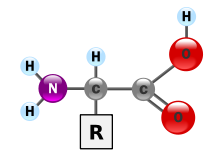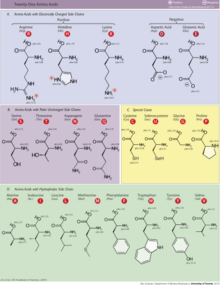Latest revision as of 12:13, 25 February 2024
 アミノ酸はタンパク質の構成要素である。
アミノ酸はタンパク質の構成要素である。
 アミノ酸は必要な栄養素である。すべての細胞に存在し、核酸、補酵素、ホルモン、免疫反応、修復など、生命維持に不可欠な分子の前駆体でもある。
アミノ酸は必要な栄養素である。すべての細胞に存在し、核酸、補酵素、ホルモン、免疫反応、修復など、生命維持に不可欠な分子の前駆体でもある。
タンパク質は、人体にとって不可欠な栄養素である。体組織の構成要素の一つであり、燃料源としても機能する。燃料として、タンパク質は炭水化物と同じくらいのエネルギー密度を提供する: 1グラムあたり4kcal(17kJ)であるのに対し、脂質は1グラムあたり9kcal(37kJ)である。 栄養学的見地から見たタンパク質の最も重要な側面と特徴は、そのアミノ酸組成である。

